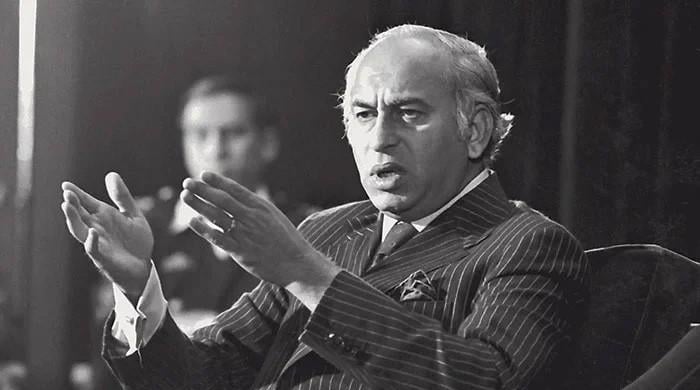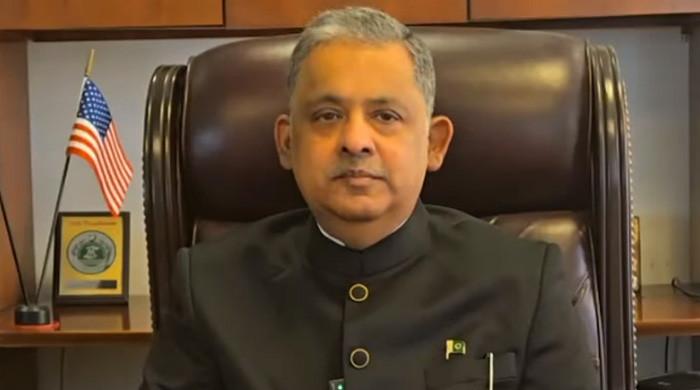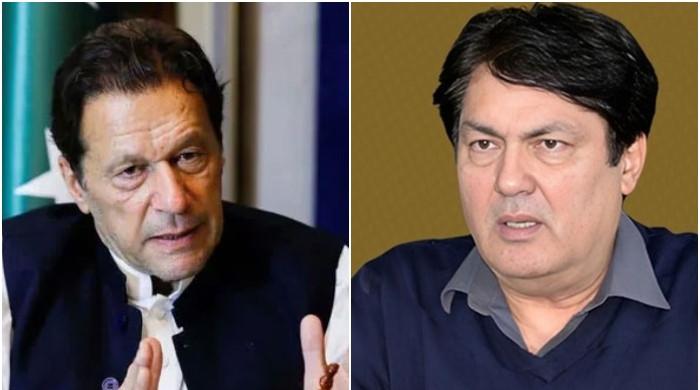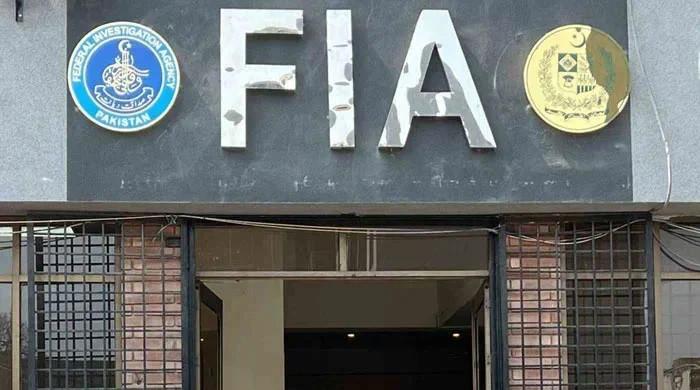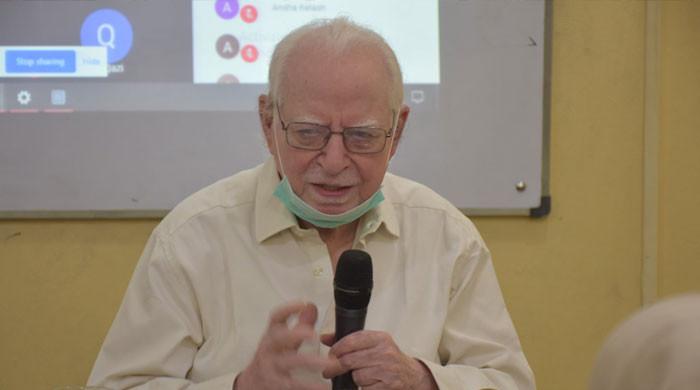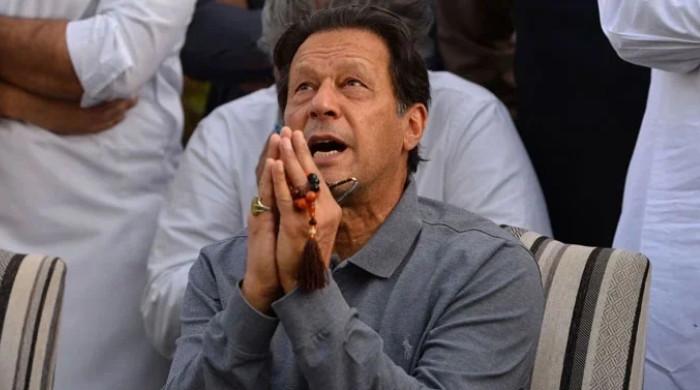Up to MPs to remove 'cancer of defection' through surgical operation: Justice Mazhar Alam Khan Miankhel
Judge says Article 63A's language is “very plain and simple”, therefore, it did not need interpretation
July 07, 2022
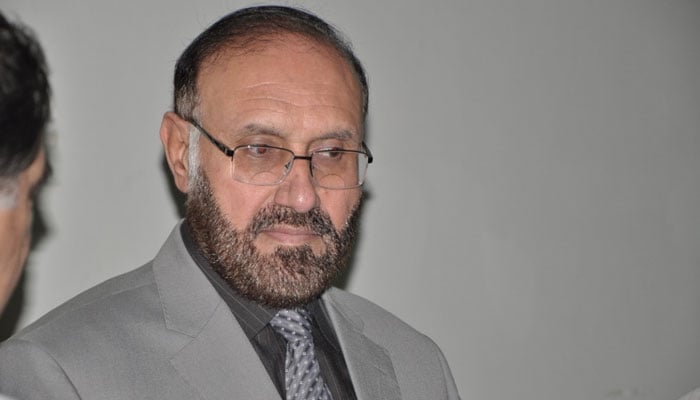
- Justice Mazhar Alam Khan Miankhel says MPs cannot be declared disqualified for life just because president expects it.
- Justice Miankhel was one of two judges out of five who had rejected president’s reference.
- Judge says Article 63A's language is “very plain and simple” therefore, it did not need interpretation.
ISLAMABAD: In his dissenting note, Justice Mazhar Alam Khan Miankhel has said that he may agree to an extent that "defection was like cancer that needed to be fixed in society" but added that it was up to the “constitution-makers to remove that cancer through a surgical operation,” not his pen.
“The argument that 'defection and horse-trading were like cancer, so they must be dealt with with an iron hand', I may agree to a certain extent with this proposition but this menace could not be curbed by the stroke of my pen," he said.
Once again, it was for the Constitution-makers to remove this "cancerous tumour through a surgical operation", Justice Miankhel wrote in his 17-page dissenting note.
The judge also shared that he kept on waiting for Chief Justice Umar Ata Bandial, Justice Ijaz ul Ahsan, and Justice Munib Akhtar to share their majority judgment on the presidential reference seeking the interpretation of Article 63(A) of the Constitution but decided to release his dissenting note as he was set to retire on July 13.
President Arif Alvi in his reference had put forward four questions before the Supreme Court. In his first question, the president had asked whether the lawmakers are violating the people’s “Amanat” entrusted to them by going against their party’s directives.
The second question asked whether a member, who goes against the party lines, vote be counted or given equal weightage as the others or should be excluded. The third question dealt with whether the member should be disqualified for life as per Article 63A (5).
The last question asked the Supreme Court what other measures and steps could be undertaken within the existing constitutional and legal framework to curb the "caner of defection, floor crossing and vote-buying”.
MPs cannot be disqualified for life through president’s proposed interpretation
On the first question, the judge ruled that the presumption that a lawmaker be “dishonest and has committed khyanat for some monetary gain or material consideration” to vote against his party’s directives in a vote of no-confidence motion “would be destructive of the intention of the Constitution makers”.
“Moreover, the argument on behalf of the President that a robust, purpose-oriented and meaningful interpretation of Article 63A which visualises this provision as prophylactic enshrining the constitutional goal of purifying the democratic process, inter alia, by rooting out the mischief of defection by creating deterrence, inter alia, by neutralising the effects of the vitiated vote followed by lifelong disqualification for the member found involved in such constitutionally prohibited and morally reprehensible conduct is not tenable under the law and is overruled, being misconceived,” said Justice Miankhel.
The judge further added that Article 63A “provides penal consequences of defection”, adding that a member cannot be declared disqualified for life “merely through the process of interpretation as proposed or expected by the president”.
“It is also to be borne in mind that Constitution envisages the trichotomy of powers amongst three organs of the state, namely the legislature, executive and the judiciary. The legislature is assigned the task of law-making, the executive to execute such law and the judiciary to interpret the laws. None of the organs of the State can encroach upon the field of the others,” said the judge.
‘Blunders in legislation must be corrected legislature’
On the question of excluding a lawmaker’s vote, the judge wrote that the president’s lawyer in the hearings “forcefully asserted” that a member who engages in a “constitutionally prohibited and morally reprehensible act of defection he cannot claim a vested right to have his vote counted and given equal weightage, and as such his vote should not be counted”.
On this Justice Miankhel explained that “voting is a formal expression of will or opinion by the person entitled to exercise the right on the subject or issue in question”.
“Right to vote means right to exercise the right in favour of or against the motion or resolution. Such a right implies right to remain neutral as well. For this, I, with respect, do not agree with the majority opinion that the vote of any member (including a deemed member) of a Parliamentary Party in a House is cast contrary to any direction issued by the latter in terms of para (b) of clause (1) of Article 63A cannot be counted and must be disregarded, and this is so regardless of whether the Party Head, subsequent to such vote, proceeds to take, or refrains from taking, an action that would result in a declaration of defection. I am utterly unable to understand how the vote (being cast contrary to the direction of the Parliamentary Party in a House), on the basis of which he would be proceeded against for defection, would not be counted in the absence of an express provision of the Constitution,” said the judge.
Justice Miankhel said that he believes that Article 63A does not bar any lawmaker from “violating the direction issued by a parliamentary party” they belong to.
“All that Article 63A prescribes is that when such a direction is violated by a member he incurs disqualification for continuing as a member of the House. Undoubtedly, the object, sought to be achieved by Article 63A, is to ensure the loyalty of the members to a political party, which sponsored the candidature of such a member at the election,” said the judge. He further added that if the interpretation given by the majority is implemented then Articles 95 and 136 would become “redundant as no resolution for no-confidence would ever succeed”.
“If blunders are found in legislation, they must be corrected by the legislature, and it is not the function of the Court to repair them,” said Justice Miankhel.
Article 63A provides 'penal consequences'
On the president’s third question, Justice Miankhel emphasised that Article 63A tries to ensure a member’s loyalty to a political party.
“It was a remedy, which the Parliament sitting as Constituent Assembly, thought fit to provide in order to curb the evil of widespread practice of unprincipled floor-crossing motivated by the concerns of personal benefit. The Parliament could as well have declared that the defector no longer is treated to be sagacious, righteous, non-profligate, honest and Ameen and, therefore, stands disqualified for life. But it did not. I, with respect, do not find myself in agreement with what has been held by the majority in their short order,” said the judge. He added that the Article under consideration itself “provides penal consequences” and its scope should not be extended unless required.
‘Legislature fully competent to enact laws’
On the last question, Justice Miankhel stated that the president’s question was “too general in nature”.
“Answering this question would be in the teeth of the doctrine of separation of powers and would be contrary to the provisions of the Constitution. No doubt, our legislature is fully competent to enact laws on the subject keeping in view all the necessities to curb, deter and eradicate the practice of defection. The question is, therefore, answered in the negative,” said the judge.
The judge concluded that after the 18th Amendment the lawmakers did not feel the need to make further changes and amendments in Article 63A.
“All the questions referred to this Court, with the cumulative effect, are of the type that answers to any question in affirmative would lead this court to exceed and overstep its domain. This in other words would mean that this court is putting something new in the text of the article which is even not the mandate of the Constitution,” said Justice Miankhel. He further added that the law was “very plain and simple” and he did not find anything that needs an interpretation.
“In my view, it’s a complete code in itself, which provides a comprehensive procedure regarding defection of a member of Parliament. It does not admit interpretation and as such the questions asked through this presidential reference are answered in negative. However, if the Parliament deems fit or appropriate may impose further bar or restriction upon the defectors,” concluded the judge.




